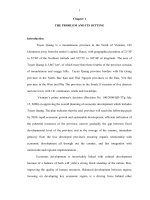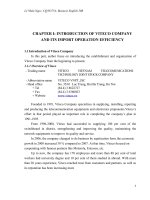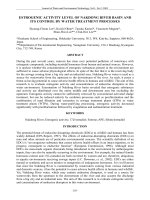communication and its forms
Bạn đang xem bản rút gọn của tài liệu. Xem và tải ngay bản đầy đủ của tài liệu tại đây (1.4 MB, 25 trang )
Communication
and
its forms
What is a communication?
Communication is the process of
exchanging information.
Communication is an important part of people´s lives.
Human beings use their language (system of
founds, words, patters, etc.) to communicate
thoughts and feelings. We also use system of
signs, symbols, gestures for conveying
information.
People need to communicate with each other and
they communicate with lots of people every day.
There is different kind of relationships like:
family, school, job, public, friends...
Different forms of communication:
Verbal communication
Non – verbal communication :
Eye contact
Facial expressions
Gestures
Animals
Sign language
Written communication
Oral communication
Verbal communication
Ve rbal c o mmunic atio n s i
c o mmunic atio n by pro no unc ing
wo rds .
People talk to each other every day. Many of us prefer
talking to others face to face.
There are different kinds of conversation:
formal,
informal,
chattering,
Advantages of verbal communication:
1. The spoken word is usually
face to face, we can ask
questions.
2. In verbal communication we
can use stress, tone and the
modulation of the voice to
express different meanings.
3. Spoken language can also
include laughter, sighs...
Formal communication
Formal communication is
when people use the
rules of language in a
conversation or in writing
format.
we use formal
communication when in
an interview or writing a
letter to a business or
maybe work. Formal
communication
Informal communication
is when people do not use the rules of
language and may use slang in
conversation.
we use informal communication when you
see a friend on the streets and you
have a chat. It would also be informal
like chatting on MSN or Facebook.
What Is The Difference Between
Formal And Informal Communication?
Formal communication is when you use sir or man
Informal communication is when you
use slang.
Non-verbal communication
- using symbols, signs, gestures.
Like all animals, we have a complex body language of postures and
facial expressions. Our bodies are constantly talking. We smile, frown
or make different gestures, shapes with our hands, etc. Sometimes we
join words with gestures, other times our bodies show our feelings or
thoughts.
We produce thousands of signs every day.
We are able to understand non-verbal performers like mime artists or
dancers who “speak” body language fluently. We also know the
language of music – it can be the universal language. Sign language
is on of a type of communication.
Sign language is a system of hand movements and gestures which
represent words and ideas
Eye contact
Eye contact is a
meeting of the eyes
between two
individuals
In human beings,
eye contact is a
form of nonverbal
communication.
Eye contact is also
an important
element in flirting.
A facial expression
Facial expressions are a form of
nonverbal communication.
They are a primary means of
conveying social information
among humans, but also occur in
most other mammals and some
other animal species.
Some examples of
feelings that can
be expressed are:
Anger
Concentration
Confusion
Contempt
Desire
Disgust
Excitement
Fear
Frustration
Glare
Happiness
Sadness
Snarl
Surprise
Gestures
A gesture is a form of non-verbal communication in which
visible bodily actions are used to communicate particular
messages
Gestures include movement of the hands, face,
or other parts of the body.
Most people use gestures and body language in
addition to words when they speak.
Animals and communication
Some animals, like dolphins or
beers, have ways of
communicating, but only
humans like using language for
fun.
Some chimpanzees have learnt
sign language, but they can
only copy language – they do
not really communicate.
Another important form of
communication is bird song
other instances include the
warning cries of many
monkeys, the territorial calls of
gibbons, and the mating calls of
many species of frog.
Written
communica
tion
Nowadays people write letters to
each other, publish newspapers and
magazines.
You can see a lot of advirtisements
anywhere you look – on billboards, ,
in newspapers, in magazines, on
posters. Advertising is an important
part of the economy and the
industry.
Requires more thought and
planning, the ideas are more
structured and better organised.
The other form of communication is
writing.
The first people scratched pictures on
to the walls of their caves.
Most of the cave drawings represented
events that happened. Around 400 B.C.
the Greek developed their alphabet.
This was the first known script that was
written from left to right.
Writing is a better form of
communication for recording facts
and ideas.
Most people consider
handwritten letters to be
more personal.
People today often do all
their writing on computers
and they have problems
writing that personal letter
by hand.
Examples of written communication :
• electronic mail
• Internet Web letters
• Proposals
• telegrams
• faxes
• postcards
• contracts
Kissing and hugging
One of type of communication is sometimes
kissing and hugging. People usually only
kiss someone on the mouth if they are
having a romantic relationship.
Parents and children will also kiss each other
on the cheek or forehead.
People also sometimes kiss each other on the
cheek in order to greet each other or say
goodbye.
People can kiss hello or goodbye on both
cheeks.
It is unusual for men to kiss each other unless
they are homosexuals.
s
r
u
o
l
o
c
d
n
a
s
l
o
Symb
an
l.
l
c
a
s
t
r
a
u
o
d
ol
se
c
u
d
g
n
n
a
i
e
ols
sb
b
d
r
m
o
y
s
w
y
es
n
a
m
i
t
t
u
e
o
m
ith
So
w
e
t
a
c
ni
u
m
m
o
c
:
e
l
p
Exam
.
m
o
d
s
i
sent w
re
p
e
r
s
l
Ow
h.
t
a
e
d
f
.
ro
th
u
a
o
e
l
d
o
f
c
o
e
ur
th
o
l
s
i
o
c
e
t
i
e
h
h
t
,w
Black is sian cultures
yA
n
a
m
n
I
Modern forms of
communication:
There are:
- Computer
- The internet
- Sending e – mails
- Mobile phone
Modern technology
influences people in such
a way that coming back
home we switch on TV or
radio and they replace
our missing
communications
Because of
developments of
technology, there are
new forms of
communication almost
every day.
The Internet
Internet is a big source of informations.
People search everything they need or want to know by Google or
Yahoo.
Young people use to chat with their friends.
The Web is generally a very friendly place.
Many people have even found love on the Net,
and have gone on to marry their cyber-partner.
The Web is like a huge encyclopaedia of information.
Nowadays you can do your shoppings by internet.
But Internet has its dangerous, too. Many of us have less motion and
exercise and we injure our eyes because of frequent sitting in front of
computers.
What Is The Advantages And Disadvantages Of
Communication (internet,telephone,webcam)?
Advantages:
Telephone: We are able to contact any
person at any time
Talking of phone its far
Disadvantages:
Telephone: We can´t take it wherever we go so we will
not be able to receive phone calls , it occupies lot
space , needs lots of connections.
Webcam: It's liking spoiling one's privacy a very bad thing
so I never use it even though I have it.
Internet: A very good tool for hackers, robbers and cyber
scam group. Because of this they are accessed to all
hte groups of people and it may lead to bank robbing.
Sending e-mail
E-mails are usually more informal than
letters. We can write a two-line messages
to someone on another continent or send
a joke to someone in the next office. It is
also not problem to send pictures or
documents by e-mail.
Oral communication
Oral communication describes any
type of inter-action that makes use of
spoken words, and it is a vital, integral
part of the modern business world.
The types of oral communication
commonly used within an
organization include staff meetings,
personal discussions, presentations,
telephone discourse, and informal
conversation. Oral communication
with those outside of the organization
might take the form of face-to-face
meetings, telephone calls, speeches,
teleconferences, or videoconferences.
Child and older people
Child today text
messages his
friends using:
his mobile phone,
Surfs the Internet to
find information for
school and e-mails
foreign friends
Some people spend
hours chatting with
friends in Internet
chatrooms
The older
generation:
used to just live with
Home phones
Faxes
Walkie-talkies
Various situations of
communications :
People speak variously in
various situations. Between our
friends or schoolmates, when
we are in ordinary situation and
when we feel relaxed, we can
use informal communication. On
the other hand, the formal
communication is necessary for
serious or official situations, for
example when you apply for a
job, or write a letter to some
company.
Vocabulary
convey – vyjadriť, vysloviť
chattering – džavotanie, táranie
gossiping – ohováranie
postures – držanie tela, postoj
gestures – gestá, posunky
hug – objať
sign language – posunková reč
deaf-mute people – hluchonemí ľudia
belch – grgať
Thank you for your attention
...
Veronika
Lopatová 4.









